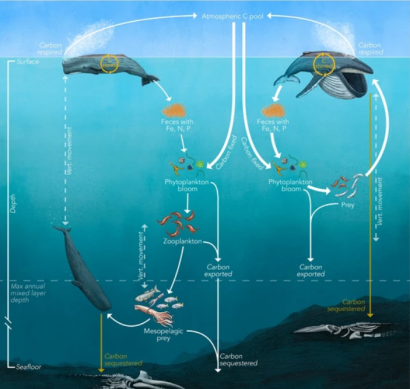Whales could be an important carbon sink, say scientists
As leaders from around the world grapple with biodiversity loss and climate change in Montreal this week, new research suggests whales could be an important part of that plan.
Whales may be the largest living carbon pool in the ocean, and are part of the marine system that is responsible for storing 22 per cent of Earth’s total carbon, according to a report Thursday in the journal Trends in Ecology and Evolution by scientists at the University of Alaska Southeast.
Yet commercial hunting of whales continues to cause population decline, and has decreased whale populations by 81 per cent, according to University of B.C. research cited by the scientists in the study.
 The study says this has unknown effects on what they call the biological carbon pump — a combination of biological, chemical, and physical processes that control the transfer of carbon into the ocean from the atmosphere over long time periods.
The study says this has unknown effects on what they call the biological carbon pump — a combination of biological, chemical, and physical processes that control the transfer of carbon into the ocean from the atmosphere over long time periods.
In the study, led led by Heidi Pearson, a biologist from the University of Alaska Southeast, researchers looked at how whales can influence the amount of carbon in our air and waters and potentially contribute to the overall reduction of atmospheric carbon dioxide.
The researchers say understanding the role of whales in the carbon cycle will require more study and a collaboration between marine ecologists, oceanographers, biogeochemists, carbon-cycle modellers, and economists.
Whales can weigh up to 28 tonnes, can live up to 100 years, and their biomass is composed largely of carbon. The authors say their size and longevity allow them to store carbon more effectively than small animals.
Whales consume up to four per cent of their body weight in krill and photosynthetic plankton every day. For the blue whale, this equates to nearly 8,000 pounds, according to the study. Their excrement is rich in important nutrients that aid in photosynthesis and carbon storage from the atmosphere.
“Whale recovery has the potential for long-term self-sustained enhancement of the ocean carbon sink,” the authors write.
“The full carbon dioxide reduction role of great whales (and other organisms) will only be realized through robust conservation and management interventions that directly promote population increases.”
The authors conclude that given the escalating nature of the climate crisis, research is needed to determine just a big a role saving the whales will have as a nature-based solution. However, they stress that while the recovery of whale populations can aid in carbon dioxide removal, it needs to be considered in tandem with strategies to reduce greenhouse gas emissions.
You can return to the main Market News page, or press the Back button on your browser.

